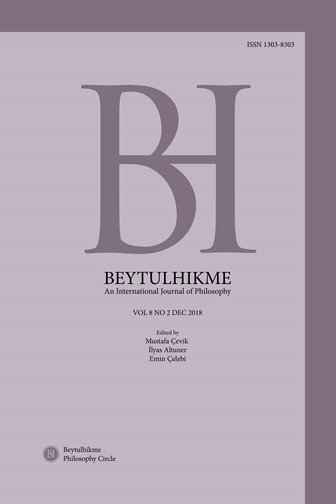Author :
Abstract
Heidegger, “Tekniğe İlişkin Sorgulama” metninde, Dasein’ın insan özüyle ve diğer varlıkların özleriyle ilişkisini belirleyen şeyin aslında Varlığın kendi kendine biçtiği kader olduğunu, ancak fail neden olma yanılgısı içindeki modern zihnin bu durumdan haberdar olmadığını iddia eder. Böylesi bir körlük, yalnızca insanın özsel özgürlüğünü tehdit etmekle kalmayıp, doğal varlıkları da otantikliklerini yitirme riskiyle karşı karşıya getirir; çünkü modern üretim biçimi doğayı insani edimler için her an hizmetimize amade, edilgen bir kaynak biçimde algılar. Batı metafiziğin temelinde yatan bu bakış açısına eleştirel yaklaşmasına karşın, Heidegger’in kendi felsefesinde insan-merkezcilik sorununu aşıp aşamadığı ise bu makalede yürütülecek olan tartışmanın konusudur.
Keywords
Abstract
In his text, “The Question Concerning Technology”, Heidegger argues that modern mind is unaware of Being’s self-destining which determines Dasein’s relation to their own essence and that of other beings because it is in a delusion of being an ‘efficient cause’. A bluntness of this kind not only endangers human-freedom but also puts natural entities at the risk of losing their authenticity since the modern mode of production regards nature as a reserve that is constantly in the service of human-doings. Accordingly, the discussion carried out in this article is, despite his criticism of the conception of ‘agency’ underlying western metaphysics, whether or not Heidegger overcomes the problem of anthropocentrism in his own philosophy.
Keywords
- Brogan, W. A. (2007). The Intractable Interrelationship of Physis and Techne in Heidegger's Philosophy. Heidegger and the Greeks. (Eds. D. A. Hyland & J. P. Manoussakis). Bloomington: Indiana University Press, 43-56.
- Heidegger, M. (1962). Die Technik und die Kehre. Stuttgart: Verlag Günther Neske, 5-36.
- Heidegger, M. (1993). The Question Concerning Technology. (Trans. W. Lovitt). Basic Writings. New York: Harper Collins, 311-41.
- Heidegger, M. (1996). Being and Time. (Trans. J. Stambaugh). Albany: State Uni- versity of New York Press, 83-94.
- Heidegger, M. (1998). On the Essence and the Concept of Φύσις in Aristotle’s Physics B, I. Pathmarks. (Ed. W. McNeil). The UK: Cambridge University Press, 183-230.
- Ruin, H. (2010). Ge-stell: Enframing as the Essence of technology. Martin Heidegger Key Concepts. (Ed. B. W. Davis). UK: Acumen Publishing, 183-93.
- Zimmerman, M. E. (1990). Heidegger’s Confrontation with Modernity Technology, Politics, and Art. The USA: Indiana University Press. Öz: Heidegger, Tekniğe İlişkin Sorgulama metninde, Dasein’ın insan özüyle ve diğer varlıkların özleriyle ilişkisini belirleyen şeyin aslında Varlığın kendi kendine biçtiği kader olduğunu, ancak fail neden olma yanılgısı içindeki modern zihnin bu durumdan haberdar olmadığını iddia eder. Böylesi bir körlük, yalnızca insanın özsel özgürlüğünü tehdit etmekle kalmayıp, doğal varlıkları da otantikliklerini yitirme riskiyle karşı karşıya getirir; çünkü modern üretim biçimi doğayı insani edimler için her an hizmetimize amade, edilgen bir kaynak biçimde algılar. Batı metafiziğin temelinde yatan bu bakış açısına eleştirel yaklaşmasına karşın, Heidegger’in kendi felsefesinde insan-merkezcilik sorununu aşıp aşamadığı ise bu makalede yürütülecek olan tartışmanın konusudur. Anahtar Kelimeler: Heidegger, insan-merkezcilik, doğa, Dasein, teknoloji, teknik, sanat.





